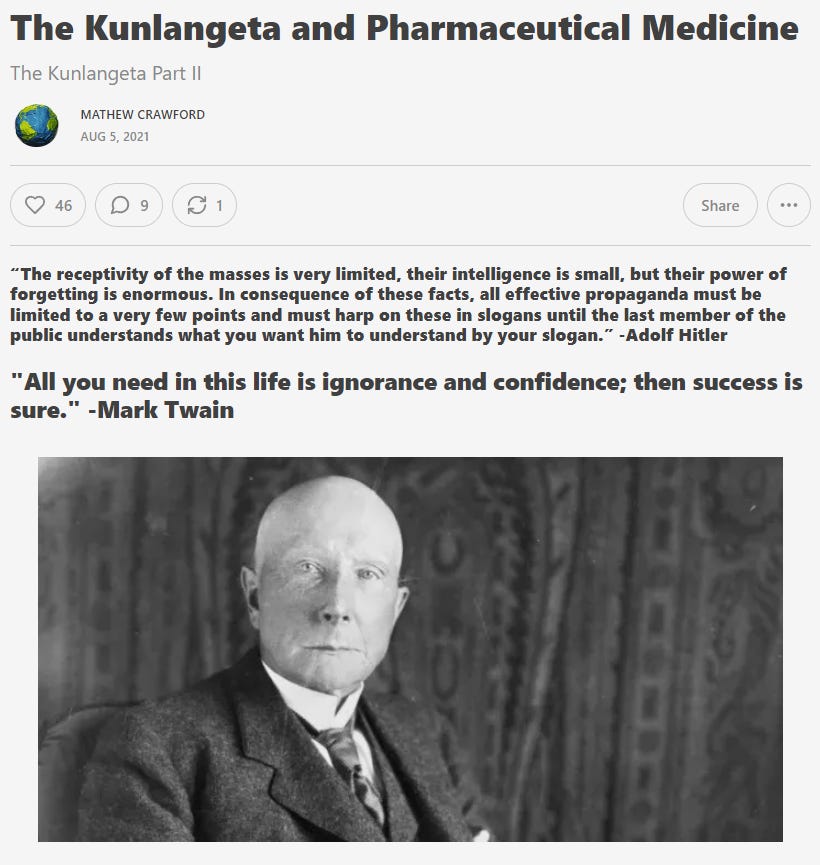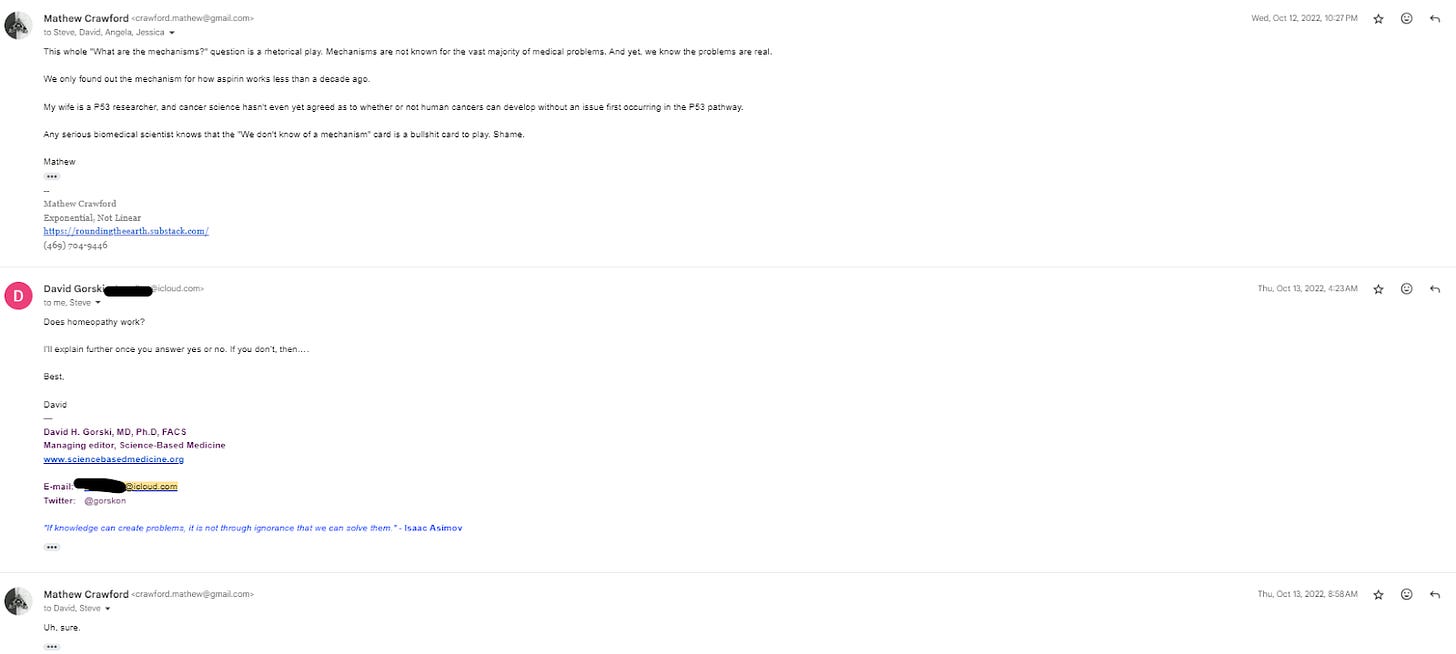A Rational Approach to Healthcare: All Philosophies at the Table
The Healthcare Wars, Part 10
Click here for more Healthcare Wars articles. Further discussions are common at the Rounding the Earth Locals channel.
Imagine the most complex machine that you can imagine. Such a machine would necessarily be more complex than any machine that you have encountered.
There are many highly complex machines—some more whimsical than others.
There is a point here…
What Would the Optimal Healthcare System Look Like?
A complete answer to such an important question is beyond the scope of this article, but I'd like to comment on the unnecessary ideological health wars. What I believe can be simply stated:
All of the disjoint philosophies of healthcare approach offer something important, but each is incomplete, and thus flawed.
During the plandemonium, I have critiqued allopathic medicine's reliance on pharmaceutical remedies, which clearly ties back to the Rockefeller agenda.
That said, if I ever have a heart attack, I'll be glad that defibrillators have become highly numerous, and American emergency rooms are the pinnacle of treatment for such events. More generally, there are tremendously many high quality doctors and surgeons in the medical system. And while I believe that many of them have had their educations at least partially sabotaged, I trust most of them better within their expertise than outside of it.
How do I feel about so-called "alternative medicine"?
It would be silly to try to summarize all that with a singular statement.
Chiropractic medicine is a revealing case-in-point regarding the complexities of judging a medical school of thought simply. The founder of chiropractic medicine, D. D. Palmer, was notably anti-scientific. As such, the early development of bone cracking techniques is not well-documented. And there is a history of horrific injuries resulting from chiropractic therapy, at least partially because the first chiropractors were not extremely careful. And yet, many of the techniques used by chiropractors have been subject to increasingly careful analysis as more practitioners got involved. As a result, a substantial subset of chiropractic technique has been absorbed into modern physical therapy.
Methods and schools of thought can and should evolve.
Do I believe homeopathy always works?
I've had a couple of email exchanges with the likely pharma shill and nasty troll David Gorski (I really do wish I could introduce any man more politely). In fact, I named my challenge to have a conversation across partisan lines after him because he claimed expertise, but refused to have a recorded conversation with me about hydroxychloroquine trials during the pandemic. He was unable to answer a simple set of questions I had about the HCQ research during a Twitter conversation, and I concluded that he was clearly disingenuous about his level of knowledge on the topic. That makes him an irresponsible and dangerous physician, if nothing else.
During an email exchange in which Gorski demanded mechanistic proof behind a statistical claim, he dodged my rebuke for the need to understand the mechanism to be concerned that a vaccine harm is likely taking place. He did this by asking me for a binary yes-no answer to whether "homeopathy works".
The problem, of course, is that any school of medicine allowed to evolve toward an optimized state cannot be said to always work or never work. In fact, we cannot even maintain a consistent definition of such an evolving school of thought, except to say that optimal health is the goal. When confronted with somebody who can handle his abuse of logic, he is forced to shield himself with such absurdities. That's not science, it's mindwar.
There is a primary principle behind homeopathy, which is that "like cures like".
Samuel Hahnemann did run experiments. Some of them were successful, and forced Hahnemann to change his views. That's how science works.
Hahnemann conceived of homeopathy while translating a medical treatise by the Scottish physician and chemist William Cullen into German. Being sceptical of Cullen's theory that cinchona cured malaria because it was bitter, Hahnemann ingested some bark specifically to investigate what would happen. He experienced fever, shivering and joint pain: symptoms similar to those of malaria itself. From this, Hahnemann came to believe that all effective drugs produce symptoms in healthy individuals similar to those of the diseases that they treat.[33] This led to the name "homeopathy", which comes from the Greek: ὅμοιος hómoios, "-like" and πάθος páthos, "suffering".[34]
Have all experiments along the lines of "like cures like" always borne fruit?
No.
And that's…just fine. What it tells us is that there is a principle in medicine that may increase (or have increased historically) the efficiency of the processes of finding treatments that work. But the body (or the billions of bodies) make for exceptional complexity, and there may be no single principle that always results in efficiency in the pursuit of optimal treatments. Heck, optimal treatments often vary greatly among individuals with broad biophysical diversity!
I can and will make similar statements about herbal medicine, which is likely understudied due to the lack of big profits at the end of the research rainbow. There are many teas, and each one may have one of many health effects. But we don't know without pooling the data. Some of that has been done, but not always rigorously or with replication.
That said, I've gradually drunk more and more tea as I've grown older. And I'm happy to include some Indian spices (tumeric and other) in my diet. I do believe that some of these have beneficial health effects, and are protective against common maladies. If nothing else, those natural "products" that have survived the test of time likely did not hurt the tribes that discovered them, and may very well have provided the advantages that helped them thrive.
Sadly, in the meantime, we are drawn into Healthcare Wars. But my advice is this: do not give up your basic rationality. Rationality may not solve all problems, but it generally handles jobs of basic logic quite well. And this is a discussion of basic logic. We may be poisoned by some chemicals used in food production, or sabotaged by a subset of GMO crops. Some or even most pharmaceutical medicines may be harmful—or on net harmful or poorly optimized due to misuse. However, it is beneficial to take a big picture approach. If we can weed the bad actors out of the system—which likely means re-engineering the system to align incentives—we can pick and choose the best of the best among all the medical schools of thought. Somewhere along the way, the boundaries will disappear. We'll just call it…healthcare.







If I have a heart attack, I too would be grateful for modern medicine. Outside those emergency situations, I take a “natural first” approach. Not to TMI anyone, but I recently learned (through western medicine confirmation) that I have a fibroid. My OBGYN was readied to remove everything. Me? I think my inner organs were placed intentionally. I didn’t like the mechanism of action on the other pharma route (encouraging blood clotting). So I am trying essential oils, notably one called Progessence, to regulate hormone levels. Four months in…it’s working like a charm. No quick-fire surgery needed. If that changes later and it’s negatively impacting my life, I’ll reconsider. Balance. Nuance. It would have been GREAT, however, if my doc had been aware of that route too and offered the oil without me having to search for ways myself. That would be the true progress.
Trauma surgery for gunshot wounds is an example of the military industrial complex getting something right. Battlefield surgery and transport is applicable to highway accidents and crime sprees in cities. We have a huge success rate for surviving gun wounds since ww2 because people dedicated lots of attention and money to the problem. Sure the military wants to heal troops and put them back in combat and lots of war is about profit. But we have some benefits too.
What I want to see is the sick get well and the wounded healed. These results are possible. All methods that "do no harm" should be evaluated.